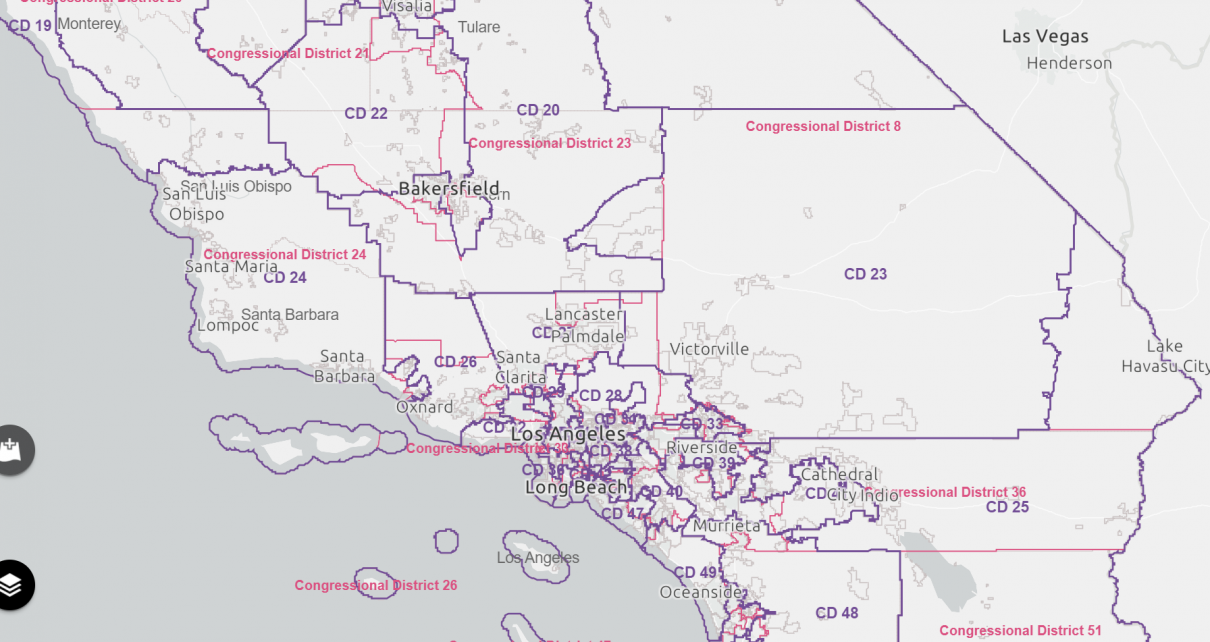
New 2023 Congressional district lines (red) over current district lines (purple). (Photo:wedrawthelines.ca.gov)
California Citizens Redistricting Commission Releases Final Drafts Of New Congressional Districts
New District lines face criticism from Democrats and Republicans
By Evan Symon, December 21, 2021 1:56 pm
The California Citizens Redistricting Commission released final drafts of where U.S. House seats are to be redistricted in California on Monday.
The Commission was formed last year to redraw Congressional boundaries within California based on new 2020 Census data. While California’s population did grow by several million people since the 2010 Census, a slowdown in the latter half of the decade caused California to lose a Congressional seat. The Commission, when evaluating where the boundaries should go, eliminated a Los Angeles-area seat, the majority Latino 40th Congressional District.
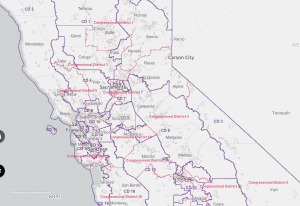
With her district essentially now absorbed by other districts, Lucille Roybal-Allard announced that she would not run next year. Other Californian Representatives such as Devin Nunes (R-CA), Jackie Speier (D-CA), Karen Bass (D-CA), and Alan Lowenthal (D-CA) have also announced their intention not to run next year. While they have given reasons ranging from retiring knowing that their district won’t be changing parties, and leaving office to pursue other political and media areas, many of their districts have proven to be affected significantly by the upcoming changes.
Some members of Congress also saw their current districts change boundaries significantly, with a number of registered voters from the opposite party likely to create a closer than expected race in their new district. This includes Fresno-area Congressmen Jim Costa (D-CA) and David Valadao (R-CA), as well as Modesto-area Congressman Josh Harder (D-CA).
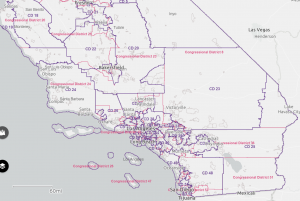
Other districts being combined could be the site of some of the biggest battles of the mid-terms next year. Specifically, the districts of Katie Porter (D-CA) and Michelle Steele (R-CA) in Orange County will likely be within a new district, creating a race between two popular incumbents. Other suddenly competitive districts in Central and Southern California could also prove to be deciding races.
Despite a delayed Census, California losing a seat, and multiple population shifts, the Commission said on Monday that they are happy with the finished product.
“We have reached the finish line for the people’s redistricting process in California,” said Commission Chairwoman Alicia Fernandez. “As Californians, my colleagues on this Commission and I answered the call to serve for this great state we honor and love. We conclude our map drawing responsibilities with pride in our final product. We started this process leaving politics out of the equation in hopes of achieving fairer and more equitable maps.”
Pedro Toledo, a Commissioner with no party affiliation added, “I’m so proud of the work that together we have completed to serve all Californians. Despite a difference of opinion at times, there was always commitment to our common goal: The goal of creating representative and fair maps for all Californians.”
District Criticism from Democrats, Republicans
While the drafted boundaries have been met with some criticism from local Democrats and Republicans over issues such as dividing some neighborhoods and not being completely transparent over the last several meetings due to map upload delays, many experts noted that Republicans and Democrats both benefited in some districts and lost out in others.
“A compromise solution, which often happens in Commission-based redistricting as opposed to more partisan methods used in other states, always gets people a bit mad,” said Emmet Price, a lawyer who has been involved in several local city redistricting complaints, to the Globe on Tuesday. “This was about as fair as you can get. If it had gone the Democrats way, Orange County would have been carved up way more. If the GOP had control, you would see red districts ringing LA a lot more prominently.”
“But we haven’t heard a lot of cries of gerrymandering and things like other states are going through. The public can still comment, and changes can be made, but it’s about as fair as it’s going to get this time around.”
However, many Republicans have charged that the new lines favor Democrats over Republicans and do not adequately represent California in the 2020’s.
“California’s redistricting committee has entirely lost track of the people who reside in the districts they have drawn,” noted RNC Spokesperson Hallie Balch in a statement on Tuesday. “Democrats have proven time and again that they do not legislate with the good of Californians in mind, and the commission has essentially created a state in which no middle-class or working family will be able to thrive in. These lines are a disappointing end to a long-fought battle for representation.”
The Commission, made up of five registered Democrats, five registered Republicans, and four independents, had to meet multiple requirements for the new districts including having an equal number of people residing in each district to comply with the U.S. Constitution, having to give minorities equal representation to comply with the Voting Rights Act, and for each district to be connected and be in one piece.
Meetings of the Commission are to be held until next week, with public comment being accepted until Christmas Eve. The current redistricting map has not yet been approved, with the Secretary of State expected to certify the new District map on December 27th. Once certified, the new Districts will have their first elections in 2022.
- Bill to Require Law Enforcement Disclosure if AI Was Used To Help Write Reports - August 7, 2025
- Gov. Newsom Files FOIA Request To ‘Expose True Cost’ Of L.A. Federal Troop Deployment for Anti-ICE Riots - August 6, 2025
- California Redistricting: How Newsom’s Plan Will Demolish Hard Fought GOP Gains - August 6, 2025


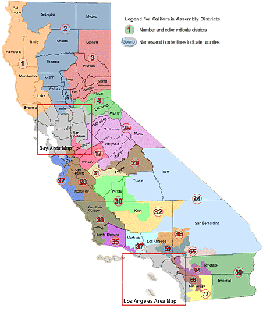
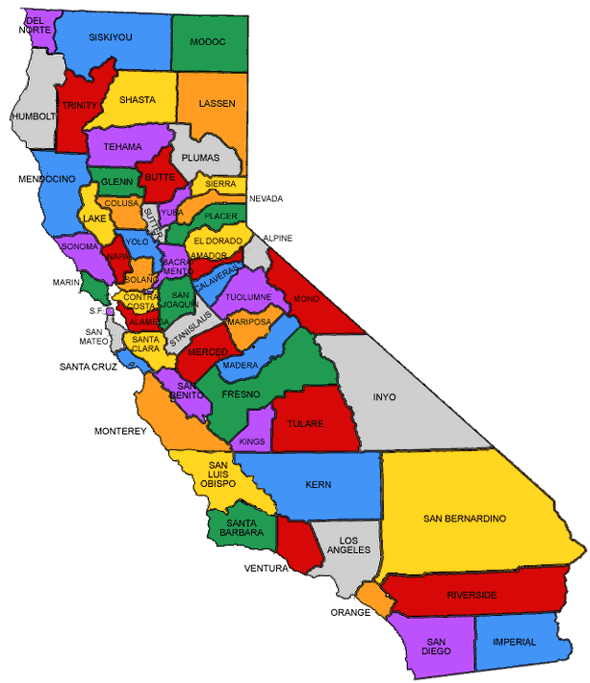

Gerrymandering California – Democrat tyranny style
One party system is never a good idea
The state is doomed under the Democrat cabal who are kept in power with voter fraud and rigged voting machines?
If truly more competitive House districts, Republican opportunities in 2022 will expand beyond the current pathetic numbers in the House running Democrat Lite campaigns. The commission created a totally Democrat gerrymander in 2011. Less so this time? Did they go better this time? Additional analyses and elections will show.